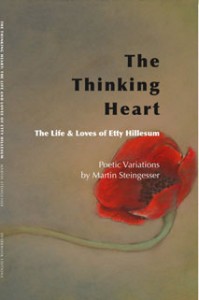The Thinking Heart: The Life and Loves of Etty Hillesum
Poetic Variations by Martin Steingesser
ISBN: 978-0-9828100-3-3
5.5 x 8.5; 44 pages $12.00
This title is out of stock.
INTRODUCTION
To become as simple and as wordless as the growing corn or
the falling rain.
—Etty Hillesum
The Thinking Heart is an original arrangement of the journal and letters of Etty Hillesum, An Interrupted Life & Letters from Westerbork, constellated as poems, which comprise what we have from this extraordinary Dutch woman before she died in Auschwitz, in 1943. The order and relationships of thoughts and images often are changed, the text edited, yet they remain true to her intentions as best as I have been able to understand.
My goal has been to select, simplify and condense while not losing anything, retaining the integrity and power of the original while somehow amplifying Etty’s voice. In her own poetic words, “to become as simple and as wordless as the growing corn or the falling rain.” I am also indebted to the translation from the Dutch by Arnold J. Pomerans, in the Owl Books edition of her journal and letters published by Henry Holt and Company. A complete and unabridged edition, Etty: The Letters and Diaries of Etty Hillesum 1941-1943, was published by William B. Eerdmans Publishing Company, in 2002.
Early in the journal Etty writes, “I am full of unease . . . a creative unease. Not of the body not even a dozen passionate nights of love could assuage it. It is almost a sacred unease. Oh God, take me into Your great hands and turn me into Your instrument, let me write.” And a little later on, “All my tenderness, all my emotions, this whole swirling soul-lake, soul-sea, soulocean, or whatever you want to call it, wants to pour out . . . to flow forth into just one short poem.”
Etty’s journal and letters were written over two years, ending with the transport to Auschwitz, where she died at 29. She never had the opportunity to write the one, short poem, yet there are moments in the journal and her letters when the prose is poetry, at least for me. Passages leap out when I read her, almost reforming of their own into poems.
There is no intention with these versions of her writing to improve on Etty’s journal, there being no substitute for experiencing her words as she writes them, their clarity and directness, their hard-won emotional insights and the intimacy they create. Why do this, then? I find the answer in something Van Gogh wrote: “This is not a thing I have sought . . . it has come across my path, and I have seized it.”
Etty inspires wonder and deepens appreciation for the kind of courage that stays a hostile course without recourse to violence, passionately committed to knowing and choosing a path of light, in service of life and spirit. Here is the story of a woman fully meeting the darkest of fates, heightened to the finest moral and aesthetic pitch by her determination, courage, and ability to transform the experience through writing.
Witnessing the conscious choices Etty makes, including refusing to escape, as she confronts the Nazis and her fears, one of the things I see would have been lost in violent response to the oppression, either for defense or retribution, would have been the ability to continue, with the opportunities for lightening suffering and for healing, her own as well that of others, in the dark journey she chose.
Light, where does it come from? Stars? Ourselves? “I cannot find the right words . . . for that radiant feeling inside me,” Etty says, “which encompasses but is untouched by all the suffering and all the violence.“ Somewhere in her long journey into the Holocaust night she discovers light in herself that became visible to others, an incandescence, still glowing. To open her journal, or read these poems, is to see this light, feel its heat.
—Martin Steingesser

